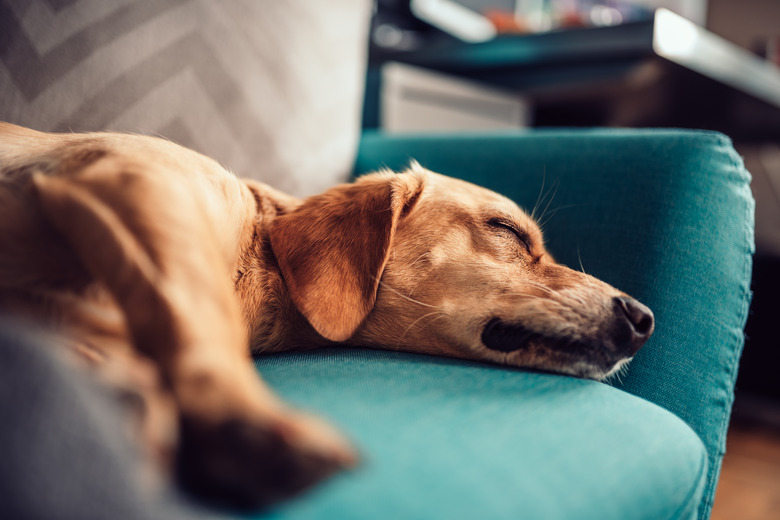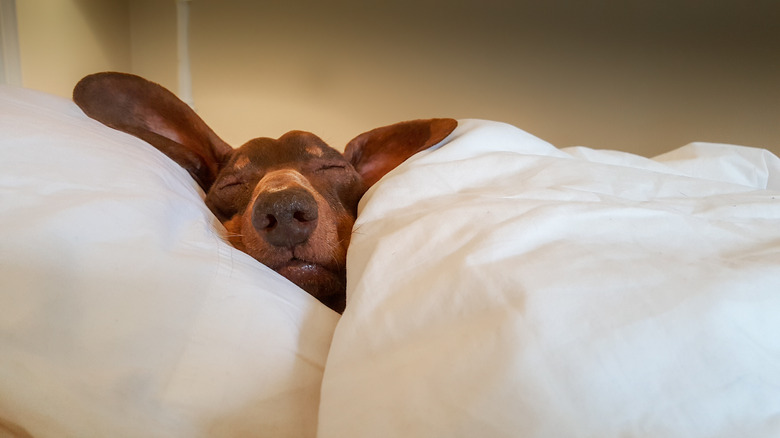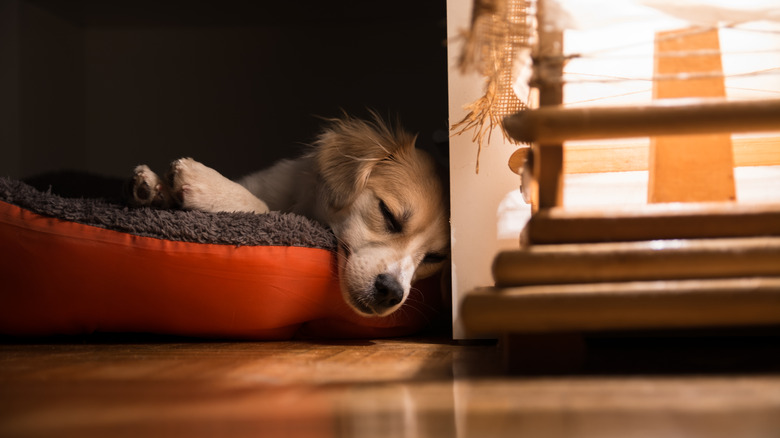Why Does My Dog Twitch In Her Sleep?
Dogs: they're just like us. When they hit the hay, after they go through short-wave sleep and they get to rapid eye movement (REM) sleep, they start to dream vividly. They may have pleasant dreams or nightmares, as people do. While humans may talk in their sleep or move around when they are in this REM state, a sleeping dog might start to bark faintly, whine, move her tail, or twitch.
Usually, a dog twitching in her sleep is not a cause for concern. If you know your dog has medical problems, however, the twitching may indicate something more than deep sleep, and you'll have to see your veterinarian immediately to determine the root cause of the issue.
What’s with the twitching?
What's with the twitching?
You may have noticed your pup twitching parts of her face when she's sleeping, or perhaps her legs are twitching a bit. Many animals have what are myoclonic twitches, which are involuntary and sudden twitches of muscles or muscle groups. These twitches are going to be less than 30 seconds long usually and may also be accompanied by kicking legs and paddling.
If you have a puppy, she is going to be much more likely to twitch in her sleep than an adult dog. The theory that scientists have come up with is that the body is determining what the limbs can do and how they function.
Senior dogs tend to twitch more than often than adult dogs when they are in rapid eye movement (REM) sleep. This may be because the part of your dog's brain that works to paralyze your dog's large muscles during sleep is not as proficient in senior dogs.
Determining if it’s a seizure or a twitch
Determining if it's a seizure or a twitch
Rarely, your dog may be experiencing more than a simple twitch. She might be having a seizure. Unlike twitching, a seizure will be more violent, and your dog's limbs will appear to be stiffer. She may also soil herself if she's having a seizure. You won't be able to wake up your dog very easily if she is in this state.
Instead, you should watch her and make sure she's OK. Also, time the seizure and perhaps even film it so you can show your veterinarian. When your dog emerges from a seizure in her sleep, she may be confused and drool on herself. Make sure you remain calm, since your dog needs your comfort when she's feeling disoriented.
If your dog happens to wake up on her own while she is having a seizure, you can gently cuddle her and put something under her head to make sure she doesn't hurt herself. Then, once it's over, alert your veterinarian as soon as possible so you can put her on medication if need be. This is especially crucial if your dog has more than one seizure in a row, called cluster seizures, or more than one in a 24-hour time period. If this occurs, you'll need to go to an emergency animal hospital if your vet is not in the office.
Waking a sleeping dog
Waking a sleeping dog
Whether your dog is having a seizure in her sleep or just twitching, it's generally not a good idea to wake her up. One reason is that your dog needs rapid eye movement sleep in order to function properly and live a healthy life, just like we do. You don't want to interrupt that, because it can be hard to get back into that state once she's out of it.
Plus, it can be dangerous to wake up a sleeping dog. Your dog may not know what she's doing when you suddenly wake him up, and she could potentially snap at you and bite you. This could occur even if you have a mild-mannered pup.
If you think your dog is having a bad nightmare – say, she's crying loudly or moving erratically – then the best thing to do is stay your distance, call her name in a soft voice, or drop an object on the floor that will wake her but won't startle her. Then, once she is fully conscious, cuddle her or give her a favorite toy or blanket. The goal is to get her to go back to sleep, especially if you wake her up in the middle of the night.
Keep in mind that your puppy or senior dog will need 18 to 20 hours of sleep per day and your adult dog will need 12 to 14 hours of sleep per day. Sleep times may vary depending on your dog's breed, size, and activity level as well. For example, larger breeds need more sleep than smaller ones. If you've noticed that your dog is sleeping more lately, it could be due to age or an underlying medical condition.
Conclusion
Conclusion
Most of the time, a dog twitching in her sleep is normal behavior, as dogs dream and move in their sleep just like we do. However, in rare cases, your dog may be experiencing a seizure. A seizure is much more violent than simple twitching, and will cause the dog's legs to stiffen. If you suspect your dog has had a seizure, contact your vet immediately. If your dog is simply twitching in her sleep, it's probably nothing to worry about, and you shouldn't wake her!


